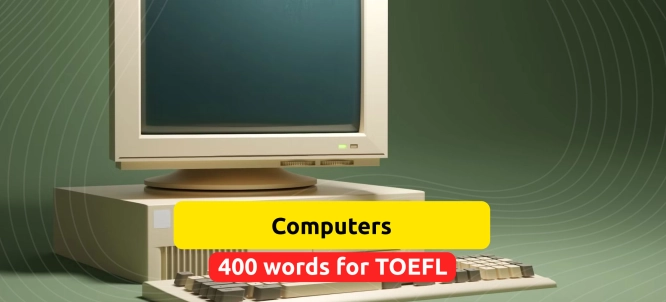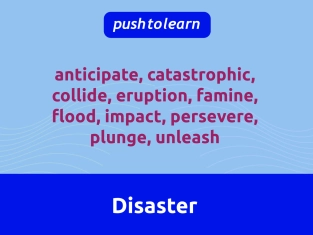by PushtoLearn
Computers
Table of Contents
Computers Flashcards - Vocabulary Practice for TOEFL
These exercises focus on Computers Vocabulary
List of Computer Words for the TOEFL
|
Word |
Definition |
Example |
|
Circulate |
To move or cause something to move continuously. |
Information circulates quickly through the internet. |
|
Corrode |
To gradually destroy through a chemical process or wear away. |
The software's inefficiency began to corrode user trust. |
|
Derive |
To obtain or take something from a specific source. |
The algorithm derives data patterns from user input. |
|
Detection |
The act of discovering or identifying something. |
The antivirus program specializes in malware detection. |
|
Expeditiously |
In a quick and efficient manner. |
The IT team worked expeditiously to restore the system. |
|
Implement |
To put a plan, decision, or system into effect. |
The company decided to implement new cybersecurity measures. |
|
Innovative |
Introducing or using new ideas or methods. |
The startup developed an innovative app for remote learning. |
|
Installation |
The act of setting up or putting something in place. |
The installation of the new software took several hours. |
|
Maintenance |
The act of keeping something in good condition. |
Regular maintenance of the server ensures smooth operations. |
|
Simulation |
The imitation of a real-world process or system. |
Flight simulation software helps train pilots effectively. |

Usage in TOEFL Exam Formats
Reading Section
-
Words like detection, simulation, and innovative commonly appear in passages about technology advancements.
-
Example Question: What does the passage suggest about the simulation software?
Listening Section
-
Terms like circulate, implement, and maintenance are often used in academic lectures or discussions.
-
Example: “Data circulates through various servers to ensure efficiency.”
Writing Section
-
Use advanced vocabulary like expeditiously and derive to make your essays stand out.
-
Example Sentence: “The results were derived from data gathered through simulation.”
Speaking Section
-
Employ terms like installation, corrode, or innovative to demonstrate vocabulary proficiency.
-
Example: “Installing innovative software can improve productivity in the workplace.”
Common Mistakes
-
Misusing "Circulate" as "Send":
-
Mistake: "The email was sent to the group quickly."
-
Correction: "The email was circulated among the group quickly."
-
Confusing "Corrode" with "Erode":
-
Mistake: "The program eroded the system."
-
Correction: "The program's flaws began to corrode the system's reliability."
-
Using "Expeditiously" in Non-Action Contexts:
-
Mistake: "The data is expeditiously in the system."
-
Correction: "The data was processed expeditiously by the system."
-
Overgeneralizing "Simulation":
-
Mistake: "The game was a simulation of fun activities."
-
Correction: "The training software provided a simulation of real-world scenarios."
-
Misapplying "Implement" for Abstract Concepts:
-
Mistake: "The idea was implemented in his mind."
-
Correction: "The new system was implemented to increase efficiency."
FAQ
What does "circulate" mean in computer contexts?
"Circulate" refers to the continuous movement of data or information, such as how emails circulate through servers.
How is "corrode" used in relation to technology?
"Corrode" metaphorically describes the gradual weakening or breakdown of systems or trust due to inefficiencies or flaws.
What’s the difference between "detection" and "identification"?
"Detection" is discovering something exists, while "identification" involves recognizing and naming it specifically.
How can I use "simulation" effectively in TOEFL essays?
Use "simulation" to discuss imitating real-world processes for training or testing purposes, e.g., “Simulation software prepares pilots for emergency situations.”
Why is "innovative" important in TOEFL responses?
"Innovative" demonstrates vocabulary range and applies to discussions about new ideas, technological advancements, or creative problem-solving.

